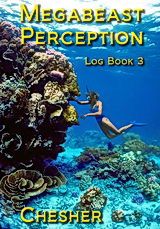A TOUCH OF MAGIC
Damn! It's just not possible! We left this morning from Segi Harbor and had to motor upwind to Hele Reef Pass so we would turn off towards Rendova. There wasn't much wind, mind you, but it was still up-wind. We reached the pass, turned 90º and put up the sails. But the wind also turned and is now blowing about 15 knots right smack on the nose.
At this time of year the tradewinds blow steadily from the Southeast. Storms come from the North to Northeast. The pilot charts for this part of the Pacific show a westerly wind is a rare wind, indeed. Our course to Rendova is 290º. Nearly west. The wind is blowing from 290º. Not 285º, not 295º, it is blowing exactly from our next anchorage. There are no other anchorages around and I don't want to go back and there is not enough wind to beat to windward fast enough to make anchor before it is dark. The only option is to motor. Everywhere we go it's the same story.
We motored from Rabaul to Malaupaina, but that was as it should be, right into the Southeasterlies. But then, when we started this round-about the Solomons, we thought we'd be sailing downwind from Malaupaina. Northwest towards Honiara. We waited until the trade winds had set in and headed off. No sooner did we get the sails up the winds stopped, switched around, and blew directly - DIRECTLY - from Honiara. Out of the Northwest. We had a following sea and headwinds. Impossible, but true.
At first it was curious. Then, we laughed and made fun of it, but every time we turned around and tried to go downwind the wind shifted, too. Every time. EVERY time. Every God Damned Time! Carl on Gypsy Cowboy used to ask when we were leaving to go somewhere, just so they could leave before or after we did and catch the favorable winds. After we parted in Yandina, he called me on the radio to tell me the strange wind conditions surrounding Moira ended about 100 miles from us where, he assured us, the trades were blowing normally. Just like always.
It's not funny anymore. It's positively weird. From Malaupaina to Honiara to Russell Islands to New Georgia and now to Rendova the wind has been dead on the nose but only when we are underway. Not 5º this way or that, the wind blows from exactly where we want to go.. Right now we have following seas and a headwind again. It's crazy!
BURUKU
We finally tuck into a tiny anchorage off the village of Mburuku on Rendova. It is a great little spot, well sheltered and with enough room for a couple of yachts.
I am about to turn in when I hear soft singing and the voices of children. The night is black. I go on deck and hear the wet rush of canoes and the musical notes of many paddles but I can see nothing at all. "Hello!"
"Hello!" comes a small voice close by in the darkness. "Do you want to sing?"
"Yes" I answer, and a mass of hands and feet materialize over the gunwale. 12 little boys board us. After much getting ready and a comedy act when three boys go off to retrieve a canoe they forgot to tie, they begin to sing. The little faces are absorbed in their own hypnotic song, their voices strong, sweet, and pure. I record their singing and at the end of each song I delight them all by playing their song back to them.
Limeade,
candy and more songs. I feel such a wonderful
communal spirit, such a lovely welcome, I
can not properly express my feelings.
As they sing, I remember watching the children of Buruku going to church this morning. It was much different than at the mission. The soft brown path wound through the dense forest green. Bright red and gold blossoms sparkled like Christmas ornaments in the trees. Overhead, friendly coconut fronds outlined the blue sky. Laughing children ran everywhere dressed in the vivid colors of their Sunday best. Their little forms bounced through the green gardens like a migration of glittering butterflies.
Everywhere in the village I find a wholeness, an acceptance of each other. There is a wholesomeness, not rigid nor cold nor righteous. Except for the very few visitors they receive, there are no strangers here.
They are a strong people. Their strength is not one of innocence as the village has an ancient and rugged history. These people have been head hunters, they have been slavers and have been enslaved. They have endured famine, diseases, and the incredible spectacle of World War II. They are unaffected but not unaware, nonmaterialistic but not antimaterialistic.
Visitors, like Freddy and I, normally get plenty of exposure to the children and to one or two adults who are somehow assigned to play host to visitors. The others, especially the younger adults, seem shy or at least very reserved. But one young lady approached me today and asked me for advice. The villagers worry about how to protect their forest.
Buruku village only occupies a very small part of the whole island of Rendova. In past years, the entire island was the common property of the people of Rendova. But the new "independent" government claims ownership of all so-called common property. Even now, she shyly told me, government representatives were surveying the islands and drawing up village boundary lines according to the present living and farming pattern. The villagers see it as the government trying to take their land and their trees. Various logging concerns are already buying the trees from the government. The people will get nothing. What can the village people do?
I have no answer for her. The problem sounds exceedingly complex. More than that, the `coconut grapevine' is extremely effective and I am hesitant to give professional advice which would, of necessity, be considered antigovernment by the officials in Honiara.
 PARADISE?
PARADISE?
Two days of hard core laziness. On the 13th I wandered through the village and returned in time for a squall and blasting Southeast winds. This morning it was raining with gusts of wind to 20 knots. It cleared up a few hours ago. A profound sense of lethargy captivates me.
Freddy, on the other hand, is a blur of activity, cleaning here and there and everywhere. She hasn't been ashore since the 11th.
James Mitchner took the name Balihi from an island in the Western Solomons; an island really named Ball'ale. It is a small island in the Shortlands. An old abandoned Japanese airstrip and some friendly but unexciting people live there. It is not the paradise Mitchner dreamed of.
The question is, does a Rogers and Hammerstein South Pacific Paradise exist? Can it? Does Rendova qualify as a paradise? If the people living in paradise don't know it....are they really in paradise? The people of Buruku on the verdant island of Rendova have very little money. But they have some, and they have plenty of food, remarkably good health, a warm, equitable climate, few or no dangerous animals, lovely flowers everywhere, good friends and neighbors, and no cars, refrigerators, TV, electricity, or the need for them. They have clean air, water, and silence.
They are happy and smiling and are super friendly to strangers. They are busy each day with their gardens, fishing, carvings, building projects (both communal and private) and talking to their many friends. Loving everyone and accepting each person of the village on their own qualities seems to be their special science.
Yet they long for the things Europeans have. They are envious of our cars, our spacious houses, electricity and all that it brings, our clothes and our cities. They have no IRS, no EPA, no Property Taxes, no OSHA, no SEC, no FBI or CIA or DOD or any of the endless bureaucracy `necessary' to fight the battle for material civilization. Nobody bugs them. Their government is too busy trying to figure out how to survive as an organization and has not become strong enough to do anything. God bless them in their confusion. Maybe they will never succeed.
But of course. I forgot. we will help them succeed.
Today the people of the Solomons are trying to decide what of their tiny paradise they can sell to the world so they, too, can have their helping of crime, narcotics (alcohol and tobacco), greed, envy, hate and war. Unsatisfied with the pittance received for copra, cocoa and other growing things, they are busy looking for minerals so the civilized world can come and tear up their islands to remove the precious nickel or copper. They are negotiating with lumber mills to come destroy their large green forests - the damp, rich rain forests that hold the precious soil and water and thus maintain the aura of fresh life and vigor of these mountains.
When they finally manage to sell these irreplaceable treasures, what will they buy? They will buy `things.' Not many things because they will literally piss away most of their money in the bars and clubs where beer will be the expensive catalyst to even more expensive anger, frustration, and violence.
They will buy or rent squalid, hot, cramped, dirty shacks with rusting tin roofs to replace the cool, clean, thatched homes clustered in their flower gardens. They will buy long hot hours laboring in the lumber mills and mines to support their onetalks. They will travel from their villages to where they labor. They will earn the privilege of paying income taxes every payday.
Some villages will get electricity with their new found wealth. Electricity along with the endless chatter of a diesel generator and an endless job of keeping it running and finding fuel for it in a world growing impoverished with oil. "Give us your bounty and we will enslave you to our economy."
People will buy better clothes, and transistor radios and motor bikes and, one day, cars. Trinkets constructed to fail after a few years and create a solid waste disposal problem. Trinkets which, like beer, are a transitory illusion of power and wealth. "Trees for Trinkets!"

More people will scrape together enough money to buy these nonessentials and ignore or resent their families and onetalks so they can hoard their wealth. How else does one acquire wealth but through selfishness? And what of the communal selfishness to sell the forest, the magical life support system of the island, for paper money printed far away? "Sell your soul for a wish, my friends?"
Question. Is it paradise when the shadow of evil falls upon the garden? Can it be paradise with no future? Doesn't paradise reach from now until tomorrow?
"No" An inner voice proclaims with sure conviction. "Paradise can not be found tomorrow. Only today. In the here in the now."
Yes, you can live in paradise and be unaware of it. The people of Rendova are in paradise but their awareness of it is to be born tomorrow. They say absence makes the heart grow fonder. You don't know what you've got till its gone.
But I know. And I will cherish this paradise with my soul and I will feel a moment of awe at its passing. A bubble of multicolored rainbows is no less beautiful because it will soon burst.
As evident from that last transmission, I'm sick. Sore throat, a little dizzy, exhausted. One of those gentle blessings of the tropics scavenged, I think, from Mrs. Fitzclarence of the SDA Church in Mbatuna.
Also, the black paint doesn't work on the mast boot, the flies are bugging me, the fan broke, it is hot and muggy and there are about 15 juvenile Solomon Islanders clinging to the gunwales and sitting in the cockpit staring fixedly at our every move. They give us the flies as well as their undivided attention.
How do you like the zoo, Mr. and Mrs. America? Of course, you are the specimens.
Freddy asks, "Don't you have anything to do today?" as they crowd closer to her and others bump their canoes with loud thuds into Moira's hull.
"Yes" a small boy shyly answers (Yes, we have nothing to do). I laugh a grotesque chuckle, feeling terrible. I stare out the porthole at a tiny angelic girl face staring in. I stare out, she stares in. Great fun. I laugh, feeling mean and she looks away, embarrassed.
A little boy softly begins to tell a story about the mountain and an American who slept on top of it one night. Freddy mumbles "Crazy Americans." She does not feel like babysitting or playing with children, being stared at or talking. When I feel bad Freddy worries. She wants the kids to go away and leave us alone. I do, too. But it is their harbor and they are just trying to be friendly. They know we are not happy and crowd around to comfort us. They do not understand our reaction. Neither do I. Oh well, tomorrow we'll be gone. Maybe we'll find an uninhabited island for awhile. Guess I'll fix the fan.
We were about to pick up the trail of the Moirae again...



